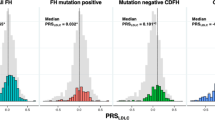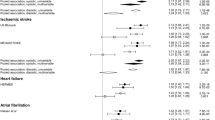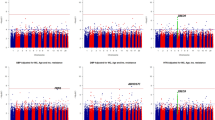Abstract
The present study aimed to investigate the association of blood pressure polygenic risk scores (BP PRSs) with coronary artery disease (CAD) in a Korean population and the interaction effects between PRSs and environmental factors on CAD. Data were derived from the Cardiovascular Disease Association Study (CAVAS; N = 5100) and the Health Examinee Study (HEXA; N = 58,623) within the Korean Genome and Epidemiology Study. PRSs for systolic and diastolic BP were calculated with the weighted allele sum of >200 single-nucleotide polymorphisms. Multivariable logistic regression models were used. BP PRSs were strongly associated with systolic BP (SBP), diastolic BP (DBP), and hypertension in both CAVAS and HEXA (p < 0.0001). PRSSBP was significantly associated with CAD in CAVAS, while PRSSBP and PRSDBP were significantly associated with CAD in HEXA. There was an interaction effect between the BP PRSs and environmental factors on CAD. The odds ratios (ORs) for CAD were 1.036 (95% confidence interval [CI], 1.016–1.055) for obesity, 1.028 (95% CI, 1.011–1.045) for abdominal obesity, 1.030 (95% CI, 1.009–1.050) for triglyceride, 1.024 (95% CI, 1.008–1.041) for high-density lipoprotein cholesterol, and 1.039 for smoking (95% CI, 1.003–1.077) in CAVAS. There was no significant interaction in HEXA, except between PRSDBP and triglyceride (OR, 1.012; 95% CI, 1.001–1.024). BP PRS was associated with an increased risk of hypertension and CAD. The interactions among PRSs and environmental risk factors increased the risk of CAD. Multi-component interventions to lower BP in the population via healthy behaviors are needed to prevent CAD regardless of genetic predisposition.
This is a preview of subscription content, access via your institution
Access options
Subscribe to this journal
Receive 12 digital issues and online access to articles
$119.00 per year
only $9.92 per issue
Buy this article
- Purchase on Springer Link
- Instant access to full article PDF
Prices may be subject to local taxes which are calculated during checkout

Similar content being viewed by others
Data availability
Raw data are available from the National Biobank of Korea (https://nih.go.kr/biobank/cmm/main/engMainPage.do).
References
Padmanabhan S, Dominiczak AF. Genomics of hypertension: the road to precision medicine. Nat Rev Cardiol. 2021;18:235–50.
Flint AC, Conell C, Ren X, Banki NM, Chan SL, Rao VA, et al. Effect of systolic and diastolic blood pressure on cardiovascular outcomes. N Engl J Med. 2019;381:243–51.
GBD 2017 Causes of Death Collaborators. Global, regional, and national age-sex-specific mortality for 282 causes of death in 195 countries and territories, 1980-2017: a systematic analysis for the Global Burden of Disease Study 2017. Lancet. 2018;392:1736–88.
Said MA, van de Vegte YJ, Zafar MM, van der Ende MY, Raja GK, Verweij N, et al. Contributions of interactions between lifestyle and genetics on coronary artery disease risk. Curr Cardiol Rep. 2019;21:89.
Cardiometabolic Risk Working Group: Executive Committee. Cardiometabolic risk in Canada: a detailed analysis and position paper by the cardiometabolic risk working group. Can J Cardiol. 2011;27:e1–33.
Evangelou E, Warren HR, Mosen-Ansorena D, Mifsud B, Pazoki R, Gao H, et al. Genetic analysis of over 1 million people identifies 535 new loci associated with blood pressure traits. Nat Genet. 2018;50:1412–25.
Evangelou E, Warren HR, Mosen-Ansorena D, Mifsud B, Pazoki R, Gao H, et al. Publisher correction: genetic analysis of over 1 million people identifies 535 new loci associated with blood pressure traits. Nat Genet. 2018;50:1755.
Lim JE, Kim HO, Rhee SY, Kim MK, Kim YJ, Oh B. Gene-environment interactions related to blood pressure traits in two community-based Korean cohorts. Genet Epidemiol. 2019;43:402–13.
Lim NK, Lee JY, Lee JY, Park HY, Cho MC. The role of genetic risk score in predicting the risk of hypertension in the Korean population: Korean Genome and Epidemiology Study. PLoS ONE. 2015;10:e0131603.
Krogager ML, Skals RK, Appel EVR, Schnurr TM, Engelbrechtsen L, Have CT, et al. Hypertension genetic risk score is associated with burden of coronary heart disease among patients referred for coronary angiography. PLoS ONE. 2018;13:e0208645.
Havulinna AS, Kettunen J, Ukkola O, Osmond C, Eriksson JG, Kesäniemi YA, et al. A blood pressure genetic risk score is a significant predictor of incident cardiovascular events in 32,669 individuals. Hypertension. 2013;61:987–94.
Parcha V, Pampana A, Shetty NS, Irvin MR, Natarajan P, Lin HJ, et al. Association of a multiancestry genome-wide blood pressure polygenic risk score with adverse cardiovascular events. Circ Genom Precis Med. 2022;15:e003946.
Vaura F, Kauko A, Suvila K, Havulinna AS, Mars N, Salomaa V, et al. Polygenic risk scores predict hypertension onset and cardiovascular risk. Hypertension. 2021;77:1119–27.
Wan EYF, Fung WT, Schooling CM, Yeung SLA, Kwok MK, Yu YET, et al. Blood pressure and risk of cardiovascular disease in UK Biobank: a Mendelian Randomization Study. Hypertension. 2021;77:367–75.
Hüls A, Ickstadt K, Schikowski T, Krämer U. Detection of gene-environment interactions in the presence of linkage disequilibrium and noise by using genetic risk scores with internal weights from elastic net regression. BMC Genet. 2017;18:55.
San-Cristobal R, de Toro-Martín J, Vohl MC. Appraisal of gene-environment interactions in GWAS for evidence-based precision nutrition implementation. Curr Nutr Rep. 2022;11:563–73.
Khera AV, Emdin CA, Drake I, Natarajan P, Bick AG, Cook NR, et al. Genetic risk, adherence to a healthy lifestyle, and coronary disease. N Engl J Med. 2016;375:2349–58.
Said MA, Verweij N, van der Harst P. Associations of combined genetic and lifestyle risks with incident cardiovascular disease and diabetes in the UK biobank study. JAMA Cardiol. 2018;3:693–702.
Kim Y, Han BG, KoGES group. Cohort profile: the Korean Genome and Epidemiology Study (KoGES) Consortium. Int J Epidemiol. 2017;46:1350.
Moon S, Kim YJ, Han S, Hwang MY, Shin DM, Park MY, et al. The Korea biobank array: design and identification of coding variants associated with blood biochemical traits. Sci Rep. 2019;9:1382.
Howie BN, Donnelly P, Marchini J. A flexible and accurate genotype imputation method for the next generation of genome-wide association studies. PLoS Genet. 2009;5:e1000529.
Tyrrell J, Wood AR, Ames RM, Yaghootkar H, Beaumont RN, Jones SE, et al. Gene-obesogenic environment interactions in the UK Biobank study. Int J Epidemiol. 2017;46:559–75.
Hosmer DW, Hosmer T, Le Cessie S, Lemeshow S. A comparison of goodness-of-fit tests for the logistic regression model. Stat Med. 1997;16:965–80.
Cheng JL, Wang AL, Wan J. Association between the M235T polymorphism of the AGT gene and cytokines in patients with hypertension. Exp Ther Med. 2012;3:509–12.
Liu DX, Zhang YQ, Hu B, Zhang J, Zhao Q. Association of AT1R polymorphism with hypertension risk: an update meta-analysis based on 28,952 subjects. J Renin Angiotensin Aldosterone Syst. 2015;6:898–909.
Franklin SS, Larson MG, Khan SA, Wong ND, Leip EP, Kannel WB, et al. Does the relation of blood pressure to coronary heart disease risk change with aging? The Framingham Heart Study. Circulation. 2001;103:1245–9.
Smith JA, Ware EB, Middha P, Beacher L, Kardia SLR. Current applications of genetic risk scores to cardiovascular outcomes and subclinical phenotypes. Curr Epidemiol Rep. 2015;2:180–90.
Kim H, Kim S, Han S, Rane PP, Fox KM, Qian Y, et al. Prevalence and incidence of atherosclerotic cardiovascular disease and its risk factors in Korea: a nationwide population-based study. BMC Public Health. 2019;19:1112.
Acknowledgements
This study was conducted with bioresources from the National Biobank of Korea, the Korean Disease Control and Prevention Agency, Republic of Korea (KBN-2021-002).
Funding
This work was supported by a National Research Foundation of Korea grant funded by the Korean Government (No. 2020R1A2C1014449).
Author information
Authors and Affiliations
Contributions
KW and EYL designed this study. KW and JEL contributed to the data processing. KW contributed to the statistical analysis and table preparation. All authors contributed to the manuscript writing and approved the final version of the manuscript.
Corresponding author
Ethics declarations
Competing interests
The authors declare no competing interest.
Ethics approval and consent to participate
Before data collection, the Korean Genome and Epidemiology study protocol was approved by the Institutional Review Board of the Korea National Institute of Health. Written informed consent was obtained from all participants. In addition, the present study was approved by the Institutional Review Board at Catholic Kkottongnae University.
Additional information
Publisher’s note Springer Nature remains neutral with regard to jurisdictional claims in published maps and institutional affiliations.
Rights and permissions
Springer Nature or its licensor (e.g. a society or other partner) holds exclusive rights to this article under a publishing agreement with the author(s) or other rightsholder(s); author self-archiving of the accepted manuscript version of this article is solely governed by the terms of such publishing agreement and applicable law.
About this article
Cite this article
Woo, K., Lim, J.E. & Lee, E.Y. Influence of blood pressure polygenic risk scores and environmental factors on coronary artery disease in the Korean Genome and Epidemiology Study. J Hum Hypertens 38, 221–227 (2024). https://doi.org/10.1038/s41371-023-00878-y
Received:
Revised:
Accepted:
Published:
Issue Date:
DOI: https://doi.org/10.1038/s41371-023-00878-y



